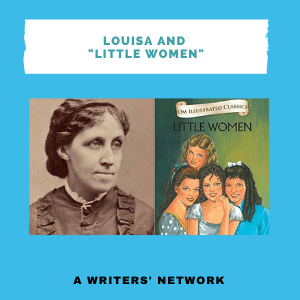Louisa May Alcott – Great Networkers Throughout History!

Louisa May Alcott was a committed feminist and abolitionist.
Alcott was born on November 29, 1832, in Germantown (now part of Philadelphia, Pennsylvania) to noted transcendentalists, Amos Bronson Alcott and Abigail May. Louisa May Alcott’s grandfather was the prominent abolitionist, Samuel Joseph May.
When Louisa was still a young girl, the family moved to Boston where her father and Henry David Thoreau started the Transcendentalist Club. Early members included Ralph Waldo Emerson, Margaret Fuller, and Theodore Parker. Later in the movement, authors Emily Dickinson and Nathaniel Hawthorne joined.
Transcendentalism was a movement to change literature, religion, culture, and philosophy that emerged in the Boston area in the mid-1800’s and later spread. Transcendentalists believed in an ideal spiritual state that ‘transcended’ the physical being. This state could only be realized through intuition rather than taught by religions.
As a young child, Louisa spent her time writing, acting out plays and taking nature walks with family friend Henry David Thoreau.
As Alcott grew, she became more and more involved in feminism and abolition. The Alcott house became a safe haven for fugitive slaves escaping the ternary of southern slave owners. At the time, Alcott was also reading material published by Seneca Falls Convention who published “Declaration of Sentiments,” a piece on women’s rights.
Due to family poverty, fifteen-year-old Alcott started to work as a teacher, seamstress, and domestic helper; however, she always used her free time to write. Her first book, published in 1854, was written for Ellen Emerson, Ralph Waldo Emerson’s daughter.
In 1962, Louisa headed to Washington D.C. to serve as a Civil War Nurse. Like many nurses at the time, she contracted typhoid fever and became ill. She was treated with the popular drug calomel, a drug-laden with mercury. Instead of dying of typhoid, Alcott received a toxic dose of mercury, and she would suffer the effects of mercury poisoning the rest of her life.
At this time, Alcott began writing observations and humor pieces for Atlantic Monthly and the Commonwealth. She also published a few “blood and thunder tales,” stories about passion, revenge and punishment under the Nome deplume A.M. Barnard.
Alcott continued to publish wholesome moral tales for children until her publisher, Thomas Niles, prompted her to write a “girl’s story”. Alcott turned to the most predominant influence in her life- her family. She wrote feverously for two and a half months about characters loosely based on her sisters. The result was her most famous book, “Little Women”.
The book was an immediate success and helped to eliminate the family’s financial problems.
After several more successful books, Alcott and her younger sister, May, toured Europe.
Like Marie Cassatt, who Alcott may have traveled within Europe, Alcott became active in the women’s suffrage movement. Upon returning home, Alcott starting writing for “The Woman’s Journal”. She joined Lucretia Mott, Elizabeth Cady Stanton, Susan B Anthony, and other advocates in traveling door-to-door encouraging women to register to vote.
In 1879, Alcott became the first woman in Concord to register to vote. Unfortunately, it took another thirty years to amend the constitution. In 1920, the 19th Amendment was passed, and women were finally granted equal voting rights.
Sadly, Alcott did not live to see that day. In March 6, 1888, two days after her father’s death, Alcott’s long battle with mercury poisoning complications ended in her Boston home. She was 56 years old, and although she never married, she left a legacy of books and her mark on both abolitionism and feminism.
